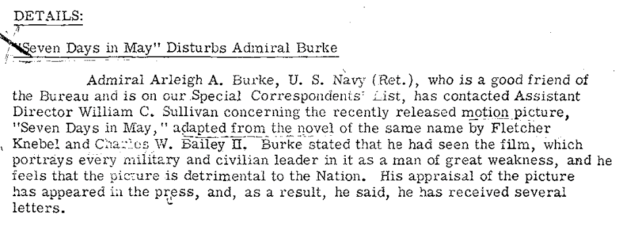The Federal Bureau of Investigation looked into film director Stanley Kubrick in the 1960s after a retired admiral complained about another director’s movie.
Admiral Arleigh Burke, then retired from the Navy, contacted the FBI after seeing the 1964 movie “Seven Days in May,” according to a document released by the bureau Wednesday.
In a letter to then-assistant director of the FBI William Sullivan, “Burke stated that he had seen the film, which portrays every military and civilian leader in it as a man of great weakness, and he feels that the picture is detrimental to the Nation,” the memo said.

Admiral Arliegh Burke asks FBI to look into Stanley Kubrick
“Seven Days in May,” directed by John Frankenheimer, is a fictional story about an attempted military coup after the Democratic president negotiates a nuclear disarmament agreement with the Soviet Union. The depiction of the military as stocked with weak and ruthless men reminded the Burke and the FBI of Kubrick’s “Dr. Strangelove,” also released in 1964.
After writing about his thoughts on the movie, Burke received a number of letters from concerned citizens about the “attacks” on the military, and wanted to know if allegations against certain individuals had merit.
ALSO WATCH: FBI Let Congressional Hacker Leave Country
Some of the letter writers made damning claims about the cast of Kubrick’s movie, which included Burt Lancaster (a “zealous Moscow stalwart”), actor Frederic March and his wife, Florence Eldridge, members of some 20 communist organizations, and another cast member whose name was redacted from the FBI’s release. Another letter writer complained two books, “The Passion of the Hawks” by Tristram Coffin and “The Military Establishment” by John Swomley, displayed damaging anti-American sentiment. “Dr. Strangelove”
Hearing from Burke, who was a “good friend of the Bureau,” the FBI looked into possible problematic connections, and the memo says they briefed the old admiral on the information.
The Bureau didn’t like the movie either. It found that “Seven Days in May”, along with “Dr. Strangelove,” and the books, derogated the military and were “harmful to our Armed Services and Nation.”
Swomley was part of a group known as Fellowship, which urged reunification, and was subject of previous investigation under the Sedition Act.
Tristram Coffin, an actor and author, was a slightly different case. The FBI notes that Coffin has been on the bureau’s Special Correspondent’s List, of which Burke himself was a member, until he wrote critically of the FBI in 1963. The FBI maintained the list of journalists and figures who could be counted on to write positively about the bureau, according to Ronald Kessler’s 1994 book about the bureau.
Kubrick, however, didn’t appear to be a threat to the bureau at that time, but the cover to the memo, dated 1965, noted that Kubrick was friend with a chess player, name redacted, who had known communist ties.

FBI Stanley Kubrick
The FBI apparently briefed Burke on the information. Burke died a few years later in 1966.
Follow Thomas Phippen on Twitter
Send tips to thomas@
All content created by the Daily Caller News Foundation, an independent and nonpartisan newswire service, is available without charge to any legitimate news publisher that can provide a large audience. All republished articles must include our logo, our reporter’s byline and their DCNF affiliation. For any questions about our guidelines or partnering with us, please contact licensing@dailycallernewsfoundation.org.


